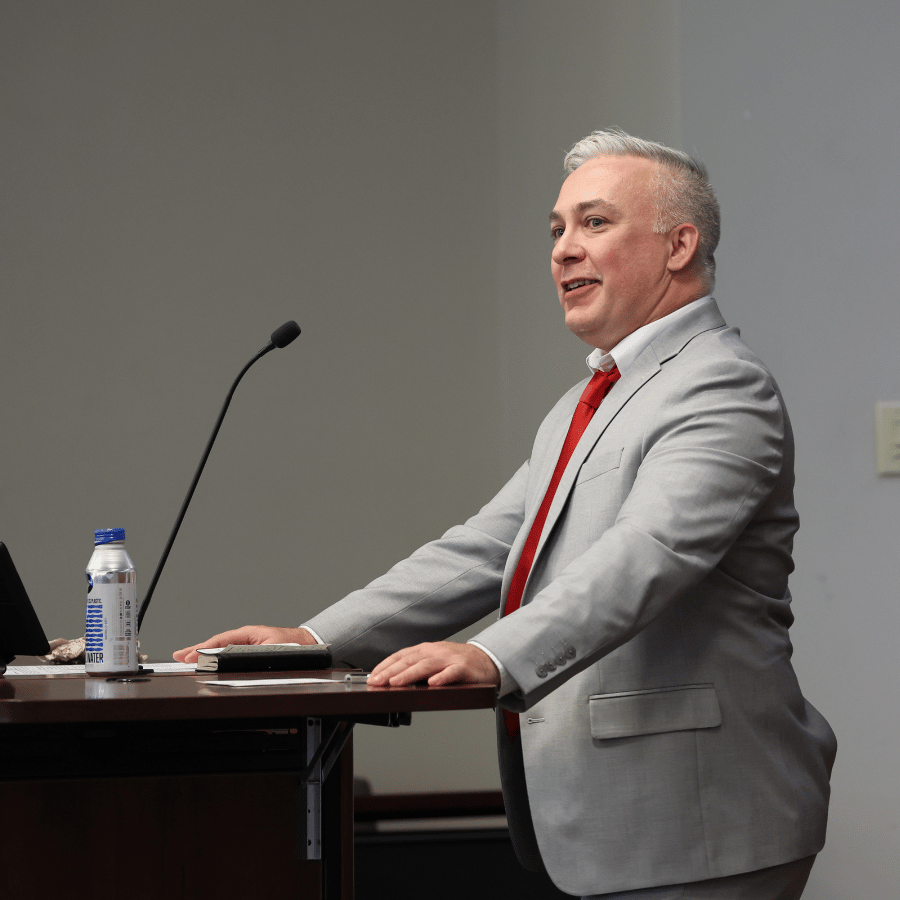Ambassador Roger D. Carstens, a former Special Presidential Envoy for Hostage Affairs (SPEHA) at the U.S. Department of State, delivered the 2025 Jonathan I. Charney Lecture in International Law. Titled “Ending Hostage Diplomacy,” his talk detailed the reality of hostage diplomacy today and U.S. efforts to mitigate the practice. He was joined by Matthew Heath, a former U.S. Marine Corporal from Knoxville, Tennessee, who was wrongfully detained in Venezuela in 2020.
Ambassador Carstens, who served as a Special Presidential Envoy for Hostage Affairs (SPEHA) at the U.S. Department of State from 2020-2025, is a retired Army Lieutenant Colonel who served in Special Forces and the 1st Ranger Batallion. He graduated from the U.S. Military Academy with master’s degrees from the U.S. Naval War College and St. Johns College.
Carstens began by laying out the goal at the core of his work: that nations will one day stop taking hostages as bargaining chips.
“We don’t want to have to do prisoner swaps for the next 100 years,” Carstens said. “The goal is maybe [to] do them for the next 10, because we’re building up a prevention and deterrence effort that will one day cost a country [to take a hostage].”
Carstens backtracked to his first days at SPEHA, when he had to start from the ground up.
“When I first got to the office, there were four people: me, my chief of staff, one guy who was trying to find another job, and one other person,” Carstens said. “We were surviving 24 hours ahead. There was no time to talk to the families [of hostages, or] try to get people out, because the workload was too immense.”
As his staff expanded, he felt the work start to come together.
“We started hiring more people, and [at] a certain point we got to look two weeks out, [then we] hired a few more people, divvied up the labor a little bit [and] could work maybe two months out,” Carstens said. “And eventually we got to a point where we could look like a year or two out, and start talking to members of Congress about how we wanted to shape legislation.”
This work with Congress eventually resulted in the passage of the Levinson Hostage Recovery and Hostage-Taking Accountability Act, which lays out the criteria for which the secretary of state can determine whether nationals abroad are detained “unlawfully” or “lawfully” by either a “foreign government or non-governmental actor” based on “credible information,” along with requiring the Secretary of State to provide an annual report to Congress on U.S. nationals determined to be unlawfully or wrongfully contained. The Act was signed into law on December 27, 2020, as part of the Consolidated Appropriations Act of 2021.
“The Levinson Act codified everything that we were within my office to create three missions for speed up,” Carstens said. “Number one, negotiate, lead [and] coordinate the negotiations to bring Americans home. Number two, support the families and number three, build out a prevention and deterrence effort so that one day we make these problems go away.”
The Levinson Act also made SPEHA a permanent office.
“Absent [of] that law, someone could wave their hand [and] the office disappears. But now the office will stay there and will have this mission with the force of law,” Carstens said.
Among other things, the Levinson Act gave visa restriction abilities to SPEHA, a tool that Carstens says has been instrumental in achieving national security goals.
“If [for example] the FSB is taking Americans and then trying to get Americans to buy them back, we can sanction the FSB,” Carstens said. “And if we do individual we can restrict their abilities to use credit cards, use their banking accounts [and] use visa restrictions.”
Carstens also talked about how this issue is being tackled on a multi-national level that began in Canada.
“The Canadians wanted to get countries [to] acknowledge that hostage-taking and using people as bargaining chips is a bad thing to do. So they created the Declaration Against Arbitrary Detention in State-to-State Relations,” Carstens said. “And up to now, they’ve had 79 countries sign it.”
He also highlighted a U.S.-led initiative that brings together countries to work toward freeing hostages multilaterally, which is gaining momentum and support in the international community.
“Let’s say that a citizen is taken from [X] country and [that] country comes to the group of now 12 countries and makes a case that their citizen was arbitrarily detained by [Country Y]. If everyone in the room agrees, then the person now becomes, I would say a goal, a cause for the other countries in the room to get that person back,” Carstens explained.

Heath discussed his detainment, which began in Venezuela on September 9, 2020. He was charged with offenses related to treason, terrorism, and arms trafficking.
“I was traveling to Aruba, and I was stopped at a normal checkpoint…and when I showed my passport, I was detained because I was an American,” he said.
Heath was held in Venezuela for two years before being released as part of an exchange with the United States. This exchange released a group of six American hostages for the nephews of Venezuelan president Nicolas Maduro — a deal negotiated by Carstens and his team.
Heath spoke to the everlasting effect detainment has on a person, even years after getting released.
“Being a wrongful detainee has an outcome. This is not something that can be fixed. There’s a before and an after, it affects every part of your life,” he said.
Heath concluded his brief but impactful statement by encouraging people to go into the field and stay up to date with its happenings.
Watch the full lecture below, or visit our YouTube Channel.